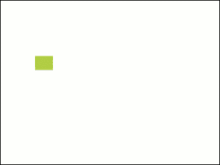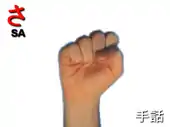| sa | |||
|---|---|---|---|
| |||
| transliteration | sa | ||
| translit. with dakuten | za | ||
| hiragana origin | 左 | ||
| katakana origin | 散 | ||
| Man'yōgana | 左 佐 沙 作 者 柴 紗 草 散 | ||
| Voiced Man'yōgana | 社 射 謝 耶 奢 装 蔵 | ||
| spelling kana | 桜のサ (Sakura no "sa") | ||
| kana gojūon | ||||||||||||||||||||||||||||||||||||||||||||||||||||||||||||
|---|---|---|---|---|---|---|---|---|---|---|---|---|---|---|---|---|---|---|---|---|---|---|---|---|---|---|---|---|---|---|---|---|---|---|---|---|---|---|---|---|---|---|---|---|---|---|---|---|---|---|---|---|---|---|---|---|---|---|---|---|
|
||||||||||||||||||||||||||||||||||||||||||||||||||||||||||||
| Kana modifiers and marks | ||||||||||||||||||||||||||||||||||||||||||||||||||||||||||||
| Multi-syllabic kana | ||||||||||||||||||||||||||||||||||||||||||||||||||||||||||||
Sa (hiragana: さ, katakana: サ) is one of the Japanese kana, which each represent one mora. Both represent [sa]. The shapes of these kana originate from 左 and 散, respectively.
Like き, the hiragana character may be written with or without linking the lower line to the rest of the character.
The character may be combined with a dakuten, changing it into ざ in hiragana, ザ in katakana, and za in Hepburn romanization. The pronunciation is also changed, to [za].
| Form | Rōmaji | Hiragana | Katakana |
|---|---|---|---|
| Normal s- (さ行 sa-gyō) |
sa | さ | サ |
| saa sā |
さあ, さぁ さー |
サア, サァ サー | |
| Addition dakuten z- (ざ行 za-gyō) |
za | ざ | ザ |
| zaa zā |
ざあ, ざぁ ざー |
ザア, ザァ ザー |
Stroke order
 Stroke order in writing さ |
 Stroke order in writing サ |

Stroke order in writing さ

Stroke order in writing サ
Other communicative representations
| Japanese radiotelephony alphabet | Wabun code |
| 桜のサ Sakura no "Sa" |
ⓘ |
|
|
 |
 | |
| Japanese Navy Signal Flag | Japanese semaphore | Japanese manual syllabary (fingerspelling) | Braille dots-156 Japanese Braille |
- Full Braille representation
| さ / サ in Japanese Braille | |||||||
|---|---|---|---|---|---|---|---|
| さ / サ sa | ざ / ザ za | さあ / サー sā | ざあ / ザー zā | Other kana based on Braille さ | |||
| しゃ / シャ sha | じゃ / ジャ ja | しゃあ / シャー shā | じゃあ / ジャー jā | ||||
| Preview | さ | サ | サ | ざ | ザ | |||||
|---|---|---|---|---|---|---|---|---|---|---|
| Unicode name | HIRAGANA LETTER SA | KATAKANA LETTER SA | HALFWIDTH KATAKANA LETTER SA | HIRAGANA LETTER ZA | KATAKANA LETTER ZA | |||||
| Encodings | decimal | hex | dec | hex | dec | hex | dec | hex | dec | hex |
| Unicode | 12373 | U+3055 | 12469 | U+30B5 | 65403 | U+FF7B | 12374 | U+3056 | 12470 | U+30B6 |
| UTF-8 | 227 129 149 | E3 81 95 | 227 130 181 | E3 82 B5 | 239 189 187 | EF BD BB | 227 129 150 | E3 81 96 | 227 130 182 | E3 82 B6 |
| Numeric character reference | さ | さ | サ | サ | サ | サ | ざ | ざ | ザ | ザ |
| Shift JIS[1] | 130 179 | 82 B3 | 131 84 | 83 54 | 187 | BB | 130 180 | 82 B4 | 131 85 | 83 55 |
| EUC-JP[2] | 164 181 | A4 B5 | 165 181 | A5 B5 | 142 187 | 8E BB | 164 182 | A4 B6 | 165 182 | A5 B6 |
| GB 18030[3] | 164 181 | A4 B5 | 165 181 | A5 B5 | 132 49 152 51 | 84 31 98 33 | 164 182 | A4 B6 | 165 182 | A5 B6 |
| EUC-KR[4] / UHC[5] | 170 181 | AA B5 | 171 181 | AB B5 | 170 182 | AA B6 | 171 182 | AB B6 | ||
| Big5 (non-ETEN kana)[6] | 198 185 | C6 B9 | 199 77 | C7 4D | 198 186 | C6 BA | 199 78 | C7 4E | ||
| Big5 (ETEN / HKSCS)[7] | 198 251 | C6 FB | 199 177 | C7 B1 | 198 252 | C6 FC | 199 178 | C7 B2 | ||
| Preview | ㋚ | 🈂 | ||
|---|---|---|---|---|
| Unicode name | CIRCLED KATAKANA SA | SQUARED KATAKANA SA | ||
| Encodings | decimal | hex | dec | hex |
| Unicode | 13018 | U+32DA | 127490 | U+1F202 |
| UTF-8 | 227 139 154 | E3 8B 9A | 240 159 136 130 | F0 9F 88 82 |
| UTF-16 | 13018 | 32DA | 55356 56834 | D83C DE02 |
| Numeric character reference | ㋚ | ㋚ | 🈂 | 🈂 |
| Shift JIS (au by KDDI)[8] | 243 90 | F3 5A | ||
| Shift JIS (SoftBank 3G)[8] | 247 200 | F7 C8 | ||
| 7-bit JIS (au by KDDI)[9] | 121 59 | 79 3B | ||
| GB 18030[3] | 129 57 210 54 | 81 39 D2 36 | 148 57 150 52 | 94 39 96 34 |
| Emoji shortcode[10] | :sa: | |||
References
- ↑ Unicode Consortium (2015-12-02) [1994-03-08]. "Shift-JIS to Unicode".
- ↑ Unicode Consortium; IBM. "EUC-JP-2007". International Components for Unicode.
- 1 2 Standardization Administration of China (SAC) (2005-11-18). GB 18030-2005: Information Technology—Chinese coded character set.
- ↑ Unicode Consortium; IBM. "IBM-970". International Components for Unicode.
- ↑ Steele, Shawn (2000). "cp949 to Unicode table". Microsoft / Unicode Consortium.
- ↑ Unicode Consortium (2015-12-02) [1994-02-11]. "BIG5 to Unicode table (complete)".
- ↑ van Kesteren, Anne. "big5". Encoding Standard. WHATWG.
- 1 2 Unicode Consortium. "Emoji Sources". Unicode Character Database.
- ↑ Scherer, Markus; Davis, Mark; Momoi, Kat; Tong, Darick; Kida, Yasuo; Edberg, Peter. "Emoji Symbols: Background Data—Background data for Proposal for Encoding Emoji Symbols" (PDF). UTC L2/10-132.
- ↑ JoyPixels. "Emoji Alpha Codes". Emoji Toolkit.
This article is issued from Wikipedia. The text is licensed under Creative Commons - Attribution - Sharealike. Additional terms may apply for the media files.

